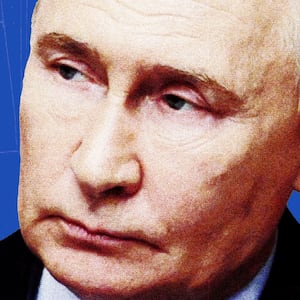Ukraine has kept steady momentum with its new incursion into Russian territory, heaping considerable strain on Vladimir Putin’s assurances that everything remains business as usual amid the ongoing war.
Launched last Tuesday, the Ukrainian army’s push into the northern border region of Kursk has forced roughly 100,000 Russians to flee what one local official has described as a “very tense situation.” It’s been a humiliating blow for the Russian president, who since the full-scale invasion began has consistently downplayed the social and economic impact of the conflict at home.
On Monday, the Associated Press reports Putin told top officials the incursion is likely designed to strengthen Ukraine’s hand ahead of prospective peace negotiations while also sucking resources from the Russian offensive in Donbas to the east.
“Now it is clear why the Kyiv regime rejected our proposals for a peaceful settlement plan,” Putin moaned. “The enemy, with the help of its Western masters, is trying to improve its negotiating position in the future.
“But what kind of negotiations can we even talk about with people who indiscriminately attack civilians, or threaten our nuclear power plants?”
Putin also made the outlandish claim that the assault had swelled the number of volunteers stepping up for military service. “It’s obvious the enemy will keep trying to destablize the situation in the border zone to try to destablize the political situation in our country,” he said. “[Our task] is to squeeze out, drive the enemy out of our territories [and] ensure reliable cover of the state border.”
Whatever the thrust of his comments, the Russian president’s tone and body language was decidedly less convincing. “Putin discussing Ukraine’s incursion into Russia, which he says the West is behind,” Nigel Gould-Davis, a former U.K. ambassador to Belarus, posted on X, formerly Twitter, along with a clip of Putin speaking at the summit. “He looks and sounds not angry, outraged, determined – but hesitant and rattled.”
Though state media has naturally tried to steer clear of anything resembling explicit criticism of the Kremlin’s military efforts, propagandists have been unable to contain their growing alarm at the pace of Ukraine’s retaliatory invasion, as Russian social media remains flooded with videos of Kursk residents fleeing their homes and begging Putin for help.
One TV show host has described the general reaction as “panicked” and “apocalyptic.” Other commentators have warned everyday Russians could maybe begin to question how exactly Moscow’s fearsome intelligence community managed to apparently waltz past any warning signs of an imminent attack.
It’s not the first time Russia’s suffered an incursion into its territory since the war began. But it is the only known case to date of these efforts being led by the Ukrainian army, rather than by pro-Ukrainian militias already inside Russia—or, indeed, by Russian forces themselves.
As Moscow scrambles to assemble further troops from its reserves, one of the most pressing questions is now whether Ukraine is using NATO-supplied weapons to carry out this latest attack. Western partners have long proven squeamish about the prospect of Ukraine using international military aid against sovereign Russian territory, fearing this would threaten to drag Russia and NATO into more direct confrontation.







